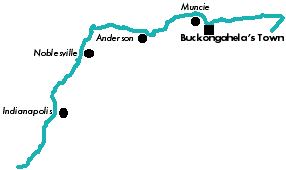Expedition Preparation Continues - August 3 1803 through September 11 1803
August 3, 1803. (Pittsburgh). Lewis informs Clark that he has received Clark's letters agreeing to accompany him; as soon as his boat is completed, he will set off for the Falls area. Lewis indicates that John Conner in February 1803 offered to go on the expedition as interpreter. Conner had not answered Lewis' letter of acceptance. He asks Clark to contact Conner. He announces that the treaty for purchase of the territory of Louisiana was received in Washington July 14 (Jackson, 1: 115-17). See John Conner below.
John Conner, 1775-1826, grew up among the Delaware and Shawnee Indians in what is now Ohio and Michigan. John and his brother William were Indian traders who moved to Indiana along the White River in 1800. In December 1802, a group of Indian chiefs from Indiana Territory met with President Jefferson in Washington to protest Governor Harrison's recent actions; John travelled with them and served as interpreter. This was probably when Conner met Lewis. In 1803, Conner lived at Buckongahela's Town near present-day Muncie. Conner refused to go on the 1803 expedition. Later, however, he served as Harrison's interpreter at several treaty negotiations for Indian lands. John remained in Indiana, and served five terms in the Indiana General Assembly (Thompson, 16-17, 37, 40, 42, 54, 270).

(Present-day Indiana towns represented with black dot)
August 21, 1803. (Louisville). Clark writes to Lewis that he has "engaged . . . the best woodsmen & Hunters . . . in this part of the Countrey. . . ." He agrees to write to Conner (Jackson, 1: 117-18).
August 28, 1803. Henry Dearborn to Thomas Jefferson"Mr. W. Clark's having consented to accompany Capt. Lewis is highly interesting, it adds very much to the ballance of chances in favour of ultimate success" (Jackson, 1: 117n).
August 26, 1803. (Falls of the Ohio). Clark writes to Conner asking him if his earlier offer to Lewis to serve as an interpreter on the expedition is still valid. Clark offers Conner $300 a year, provisions, and clothing (Jackson, 1: 118-19).
August 31, 1803. Lewis' Journal: Lewis and a party of eleven men start down the Ohio River from Pittsburgh (Moulton, 2: 65-67).
September 1, 1803. Lewis Journal"The Pilott informed that we were not far from a ripple which was much worse than any we had yet passed . . . . we passed the little horsetale ripple or riffle with much deficulty, all hands laboured in the water about two hours before we effected a passage; the next obstruction we met was the big-horse tale riffle, here we wer obliged to unload all our goods and lift the emty Boat over, about 5 OCock we reach the riffle called Woollery's trap, here after unloading again and exerting all our force we found it impracticable to get over, I therefore employed a man with a team of oxen with the assistance of which we at length got off we put in and remained all night having made only ten miles this day" (Moulton, 2: 67).
September 3, 1803. William Clark assigns power of attorney to his brother Jonathan in Louisville (Holmberg, Timeline).
September 8, 1803. (Wheeling, Va.). Lewis writes to Jefferson describing the departure from Pittsburgh and the trip down the Ohio River to Wheeling (Jackson, 1: 121-23). See September 1, 1803 Lewis Journal this page.
September 11, 1803. (Near Louis-ville). Clark writes Lewis that Conner is not interested in joining the expedition to the West (Jackson, 1: 123-24).
September 11, 1803. William Clark to Meriwether Lewis"Agreeable to your wish I sent an express to the Dellaware Towns on White River . . . . Connor has a verry large assortment of goods on hand and cant accompany us . . . . He Says that if he had 'nothing to do at the prest. he would not oblege himself for the sum I offered him (300) pr. & should not think himself two much recompensed for 5000$ even if he was able to leave his home" (Jackson, 1: 123).
